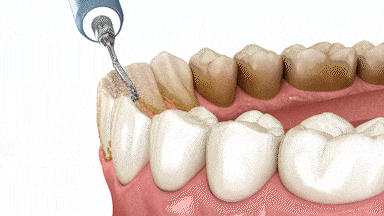Dry Mouth (Xerostomia)
Dry mouth, or xerostomia, is a condition where salivary output is diminished. There are many different things that can cause dry mouth. These include: dehydration, snoring, mouth breathing, alcohol and tobacco use, certain diseases (e.g. Sjogrens Syndrome and Diabetes), and most commonly, certain prescription drugs.
 Saliva is necessary for breaking down food, swallowing, and bathing and cleaning the teeth. In addition, saliva contains certain antibodies and minerals that help fight tooth decay and repair surface damage to the teeth. When salivary flow is inadequate, it leads to such things as difficulty eating and swallowing, bad breath, and increased risk and presence of tooth decay.
Saliva is necessary for breaking down food, swallowing, and bathing and cleaning the teeth. In addition, saliva contains certain antibodies and minerals that help fight tooth decay and repair surface damage to the teeth. When salivary flow is inadequate, it leads to such things as difficulty eating and swallowing, bad breath, and increased risk and presence of tooth decay.
It is therefore important to take measures to keep your mouth moist and clean. This can be done by cutting out or limiting sugary drinks and candy, frequently sipping water, sugarless gum/mints with Xylitol (a naturally occurring sugar that reduces the levels of decay causing bacteria), over the counter saliva substitute products, fluoride containing products, and regular dental checkups.
Sealants
Sealants are a way to prevent tooth decay from starting during children’s cavity prone years. It is a tooth colored material that fills in pitted and grooved areas of the teeth and acts as a shield, so the bacteria cannot hide out in those areas and start the decay process. Sealants are placed in the adult back teeth where most cavities are found. It is a quick and painless procedure that does not involve numbing of any areas. Dental plans may cover sealants for children under the age of 18. Contact your dental insurance to find out more information.
Bruxism
Bruxism is excessive grinding of the teeth or clenching of the jaw. It can be caused from an abnormal alignment of the teeth, stress or anxiety, snoring/sleep apnea, lifestyle habits (i.e. excessive caffeine, smoking, drinking alcohol and recreational drugs. Also, some anti-anxiety medications can cause it as well). It is also said to be hereditary. It is usually done unconsciously and can lead to tooth/jaw problems. Signs and symptoms include chipped or cracked teeth, overly sensitive teeth, headaches, ear pain, wearing away of tooth structure, facial pain with tense jaw muscles, TMJ (Temporal Mandibular Joint) popping or clicking, or locking of the jaw. It can happen to children and adults. Children, however, usually outgrow this habit when their adult teeth come in. Bruxism can happen during the daytime or nighttime. A customized bite guard is recommended to prevent tooth damage and alleviate any pain.
X-Rays (Radiographs)
I know a lot of people do not like to have x-rays taken, but it is a necessary tool to aid in your oral health care. Here at St. Apollonia Dental, we use digital x-rays, which are minimal in radiation. These include bitewings, panoramic, and our newest addition, 3D CAT scan x-ray.
Bitewings are used to detect tooth decay where we cannot visually see. The early stage of decay is often painless and can go undetected without the x-rays. This can lead to pain, abscesses, and broken teeth just to name a few.
A panoramic x-ray gives us an overall view of the bone, roots of the teeth, temporomandibular joints (TMJ), and maxillary sinus cavities. It aids in detecting cysts or tumors that can develop within the bone, abscesses, and TMJ health. It also provides information necessary to evaluate mixed dentition for orthodontic referrals and growth and location of the 3rd molars (wisdom teeth).
Our newest addition is the 3D CAT scan x-ray. It gives us invaluable information necessary for implant placement. It also provides us with location of different nerves and hidden pathology such as fractured roots.
We recommend yearly bitewings and a panoramic x-ray every 5 years to provide you with the best care and treatment.
Periodontal Disease (Gum Disease)
Plaque is a sticky substance that contains bacteria and when left undisturbed, it will harden into what we call calculus (tartar). The calculus can spread below the gum line making it more difficult to clean and, in turn, cause periodontal disease. The word periodontal means “around the tooth.” Periodontal disease is an infection of the gums and bone that hold your teeth in place and is classified according to severity.
Gingivitis is a mild form of periodontal disease that causes the gums to become red, swollen and bleed easily. At this stage, gingivitis is reversible with the help of regular cleanings with your dental professional and the proper home care.
If left untreated, gingivitis can advance to periodontitis, a more severe form of gum disease. At this stage the bacteria in the plaque produce toxins and irritate the gums causing them to pull away from the teeth forming a pocket. The pocket harbors the harmful bacteria and allows the disease to progress. The immune system tries to fight the infection causing the gums to recede and the supporting tissue and bone to deteriorate. The loss of these supporting structures causes the teeth to become loose and eventually fall out or require extraction.
As the harmful bacteria reside in the pockets, they start to multiply and facilitate further destruction. The pockets become deeper and harder to keep clean. At this stage, the disease is unable to be reversed and your dental needs would be assessed and a plan put in place to halt the disease and promote healing.
Regular cleanings and adequate home care are your best safe guards against gum disease.
